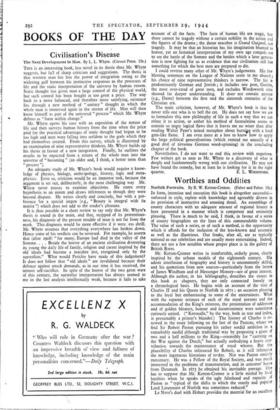BOOKS OF THE DAY
Civilisation's Disease
The Next Development in Man. By L. L. Whyte. (Cresset Press. 15s.) THIS is an interesting book, less novel in its thesis than Mr. Whyte suggests, but full of sharp criticism and suggestions. The thesis is that western man has lost the power of integration owing to the widening gulf between his instinctive responses to the processes of life and the static interpretation of the universe by human reason. Static thought has given man a large control of the physical world, but such control has been bought at too great a price. The way back to a more balanced, and therefore more satisfying, existence lies through a new method of " unitary " thought in which the whole man is immersed again in the stream of life. Man will then know himself as part of the universal " process " which Mr. Whyte defines as "form within change."
Mr. Whyte opens his case with an exposition of the nature of life and then surveys human history from the time when the price paid for the practical advantages of static thought had begun to be too high and men were falling into serfdom to the gods which they had themselves created. From this survey, which is illustrated by an examination of nine representative thinkers, Mr. Whyte builds up his thesis in favour of a new integration. Finally, he outlines the results to be expected from a return of the whole man into the universe of " becoming " (an older and, I think, a better term than " process ").
An adequate study of Mr. Whyte's book would require a know- ledge of physics, biology, anthropology, history, logic and meta- physics. Even so, criticism would be an immense task, because the argyment is set out, deliberately, in the most challenging way Mr. Whyte never pauses to examine objections. He states every hypothesis as an axiom and draws inferences as though they were beyond dispute. He writes clearly and concisely, but with a pre- ference for a special jargon (e.g., " Beauty is integral with its matrix ") which does not add to the reader's pleasure. It is thus possible in a short review to say only that Mr. Whyte's thesis is sound in the main, and that, stripped of its pretentious- ness, his diagnosis of the present trouble of man is not far from the mark. This diagnosis would be more effective if it were less shrill. Mr. Whyte assumes that everything everywhere has broken down. Hence some of his verdicts can be reversed. For example, he asserts that (after 1918) " for many, Europe had died in the valley of the Somme. . . . Beside the horror of an ancient civilisation destroying its young the daily life of family, religion and .career inspired by the old ideals had become a macabre jest, recognised only by the surrealists." What would Pericles have made of this judgement? It does not follow that "old ideals" are invalidated because their defence against attack demands, as in our time it has received, the utmost self-sacrifice. In spite of the horror of the two great wars of this century, the surrealist interpretation has always seemed to me in the last analysis intellectually weak, because it fails to take account of all the facts. The facts of human life are tragic, but there cannot be tragedy without a certain nobility in the action and the figures of the drama ; the danse macabre is Grand Guignol, not tragedy. It may be that an historian has his imagination blunted to horror, yet an historical interpretation of my own age compels me to see the battle of the Somme and the battles which a later genera- tion is now fighting for us as evidence that our civilisation still has something for which the best men are prepared to die.
I could reverse many other of Mr. Whyte's judgements. His few blasting sentences on the League of Nations seem to me absurd ; his choice of nine representative thinkers is narrow. The list is predominantly German and Jewish ; it includes one poet, Goethe, the most over-rated of great men, and excludes Wordsworth who showed far deeper understanding. It doer not contain anyone (e.g., Dante) between the first and the sixteenth centuries of the Christian era.
The main criticism, however, of Mr. Whyte's book is that he never tells one who is to bell the cat. He does not say how we are to formulate this new phildsophy of life in such a way that we can relate it to action, or rather his method of formulation seems to contain so many logical flaws that it leaves me no wiser than after reading Walter Pater's mixed metaphor about burniitg with a hard gem-like flame. I am even more at a loss to know how to apply the large political generalisations (which remind me uneasily of a good deal of tiresome German word-spinning) in the concluding chapter of the book.
Nevertheless, I do not want to end this review with negations. Few writers get as near as Mr. Whyte to a discovery of what is deeply and fundamentally wrong with our civilisation. He may not have found the remedy, but at least he is looking for it in the right


























 Previous page
Previous page